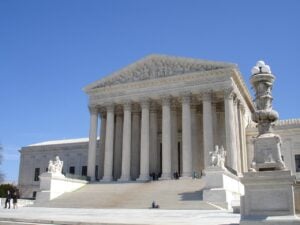Supreme Court Will Hear A Sports Law Case That Could Destroy The NCAA's Restrictions On Athletes
An athlete-friendly decision has the potential of further narrowing the differences between college athletes and professional athletes with regard to their earning capacities.

The U.S. Supreme Court (Photo by David Lat).
The Supreme Court of the United States has decided to hear a case that dates back to 2014 on the issue of whether the NCAA should be able to put a cap on education-related compensation and benefits for college athletes. A most recent decision in the case on appeal was that schools should have the option, without NCAA interference, to provide unlimited educational benefits to enrolled athletes. The highest court considering the issue could have much greater consequences for these athletes as well as the NCAA.
The NCAA would like greater restrictions to be put in place; however, the Supreme Court could conceivably hold that no form of payment, whether it be tied to education or not (i.e., payment for performance in the form of a salary), may be limited by the NCAA. In essence, an athlete-friendly decision has the potential of further narrowing the differences between college athletes and professional athletes with regard to their earning capacities.

Navigating Financial Success by Avoiding Common Pitfalls and Maximizing Firm Performance
The NCAA has issued a public statement expressing pleasure that the U.S. Supreme Court will review the NCAA’s right to provide college athletes with the educational benefits they need to succeed in school and beyond. “The NCAA and its members continue to believe that college campuses should be able to improve the student-athlete experience without facing never-ending litigation regarding these changes,” said NCAA Chief Legal Officer Donald Remy.
Therein lies the NCAA’s main objective — removing, once and for all, the onslaught and continued threat of litigation in the realm of antitrust law. It is fed up with fighting these battles and is on a mission to either have the Supreme Court rule that its restrictions fall within what is allowed under antitrust law or to persuade Congress to issue it an antitrust exemption from future litigation in this space.
“If I were writing the Supreme Court decision in the College Athlete Grant In Aid case, this would be my opening line: “Operating a $13 billion college sports cartel under the guise of education makes it no less of a cartel. Legally, it’s the same. Morally, perhaps it’s worse,'” tweeted sports and antitrust law professor Marc Edelman in the immediate wake of the Supreme Court announcing that it will be taking up the issue. In essence, Edelman believes, as do many, that the NCAA should not be shielded from the traditional application of antitrust law just because it makes the claim that its restrictions are tied to an individual’s educational experience.
The plaintiffs’ lawyer, Jeffrey Kessler of Winston & Strawn, has already declared his belief that the plaintiffs will prevail at the highest level, adding, “We feel very confident in our position and we’re looking forward to having this case heard.”
Sponsored

Early Adopters Of Legal AI Gaining Competitive Edge In Marketplace

Navigating Financial Success by Avoiding Common Pitfalls and Maximizing Firm Performance

Legal AI: 3 Steps Law Firms Should Take Now

Legal AI: 3 Steps Law Firms Should Take Now
Oral arguments will be heard in the early part of 2021, with a decision by the Supreme Court coming in June. Florida is set to become the first state to allow college athletes to commercially exploit their publicity rights as of July 1, 2021.
Darren Heitner is the founder of Heitner Legal. He is the author of How to Play the Game: What Every Sports Attorney Needs to Know, published by the American Bar Association, and is an adjunct professor at the University of Florida Levin College of Law. You can reach him by email at heitner@gmail.com and follow him on Twitter at @DarrenHeitner.
Sponsored

How Generative AI Will Improve Legal Service Delivery









